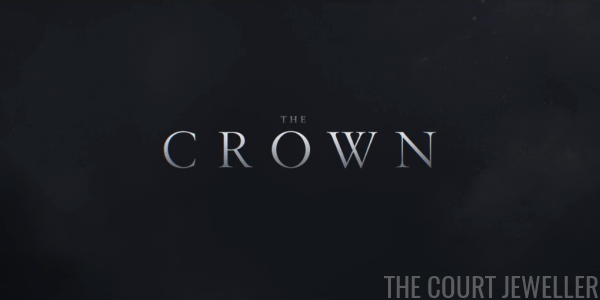
The second episode of this season of The Crown, “A Company of Men,” wasn’t particularly jewel-heavy, but we’ve still got plenty of fiction vs. history to unpack here. If you need to catch up on any of my previous Crown recaps or posts, you can head over here first!
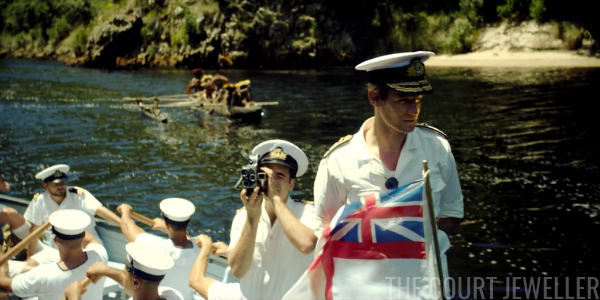
It’s November 1956, and Philip’s Commonwealth tour continues. Mike Parker wields the camera that Elizabeth gave her husband as a going-away present.
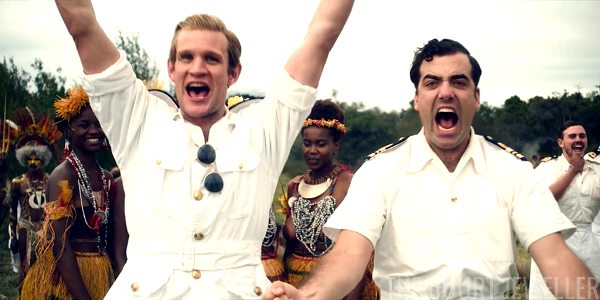
News reports from the real tour note that it followed the general format of these royal visits (meeting local dignitaries, touring factories, watching demonstrations), but the show presents the tour as one physical challenge after another. Mike Parker tells us that they lost every sports contest to the locals — until they challenged them to play cricket, a game none of them had seen before. (That’s basically colonialism in a nutshell, huh?)
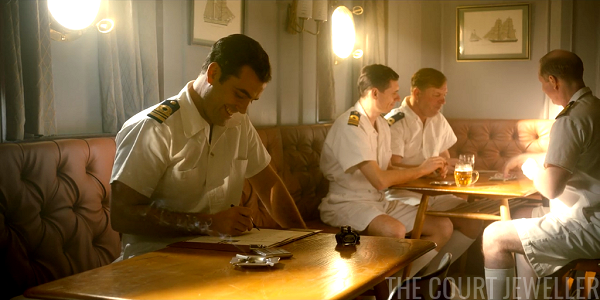
Mike chuckles to himself aboard Britannia as he recounts tales of their adventures to Baron, head of the Thursday Club.
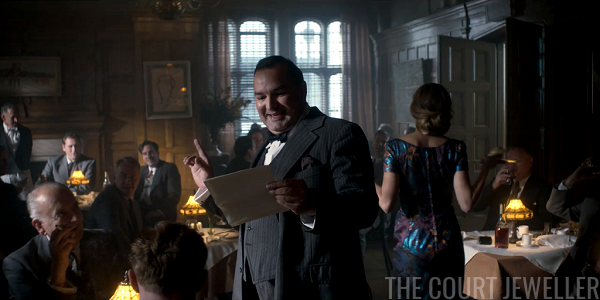
But there’s a biiiiig historical problem here. Although The Crown shows Baron reading Parker’s letter to the other members of the Thursday Club, the real Baron died suddenly after an operation in early September 1956, more than a month before Philip and Mike even left for their tour. (Having a ghost read the letter would add an intriguing supernatural element to the show, I’ll admit.)
The Ghost of Baron chuckles as he reads out one sentence in particular: “What happens on tour, stays on tour!” (Ugh, Mike, come on.)
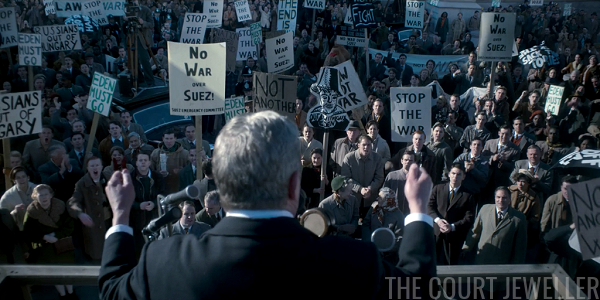
Meanwhile, the people of Britain are not pleased with Anthony Eden’s war over the Suez Canal, and they’ve taken to Trafalgar Square to air their grievances.
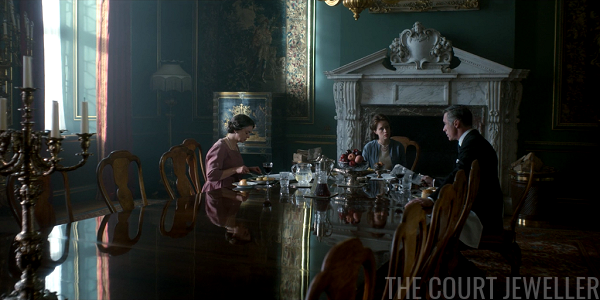
Dickie Mountbatten fights his way through the protesting crowd on his way to Buckingham Palace, where he dines with Elizabeth and the Queen Mother. (Still ticked that the Queen Mum has been given such a minimal role in this series. She was still a vital member of the royal family long after her husband’s death; her public engagements in 1956 included an important visit to Paris, where she opened the Franco-Scottish exhibition.)
Dickie tells them (and us) how dire the situation has gotten in public because of the war. (Like the Queen wouldn’t know this?) Fuel rationing is threatened, moral has soured, and things are almost as bad as in 1939.
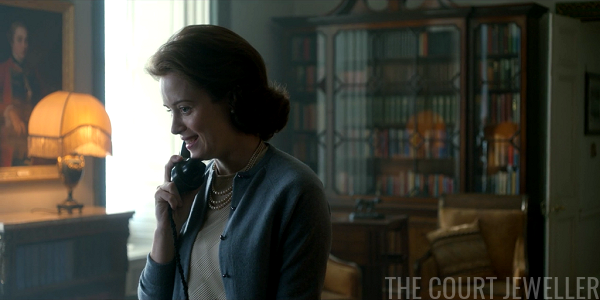
Their meal is interrupted by a welcome surprise, though: Philip is on the phone! Elizabeth hurries to chat with her husband for the first time, apparently, in quite a while.
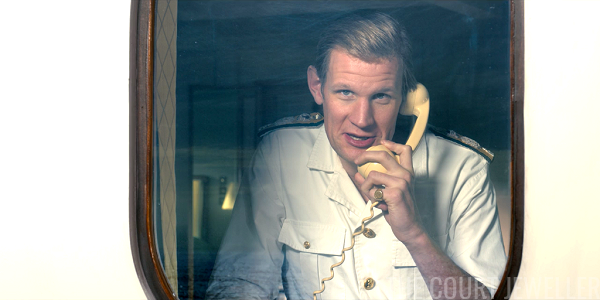
But the connection is bad, and the two do a whole “can you hear me now?” routine before Philip gives up and hangs up the phone entirely.
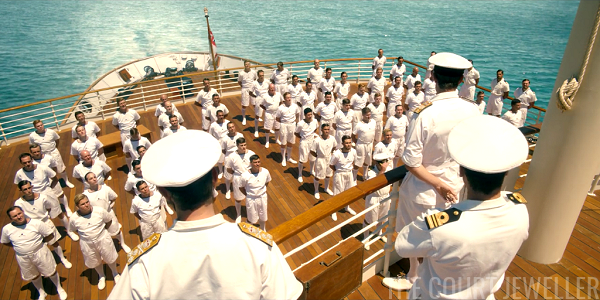
He heads out to address the sailors aboard Britannia, reminding them (and us) that he’s heading to Australia ASAP to open the Olympic Games in Melbourne.
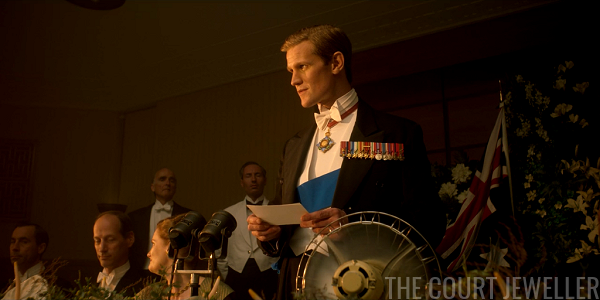
Fast forward to late November, when Philip has arrived in Australia. Here’s he’s speaking at a state luncheon (probably the one held in Sydney on November 29). He’s in full “battle dress,” orders and medals and all.
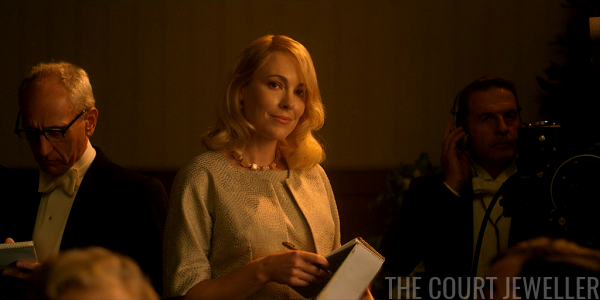
He spots one particularly interesting reporter in the crowd during the speech. Mike identifies her as Helen King, a reporter for The Age, a Melbourne paper. (She appears to be fictional.) I’m pretty fond of the era-appropriate costume necklace she’s wearing here, which looks like it could be Lisner or Coro.
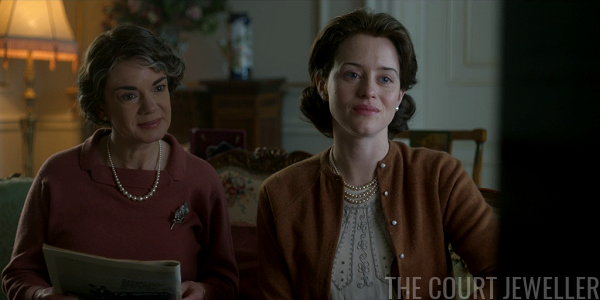
We jump back to London and travel back in time to November 22. The two Elizabeths watch Philip’s speech in Melbourne at the opening ceremonies of the Olympic Games, and the Queen Mother congratulates herself on having the idea to send Philip on tour in the first place. The Queen Mum’s wearing an interesting (and, I believe, invented) brooch here with a leafy design. The Queen, sadly, goes pretty much brooch-less this episode.
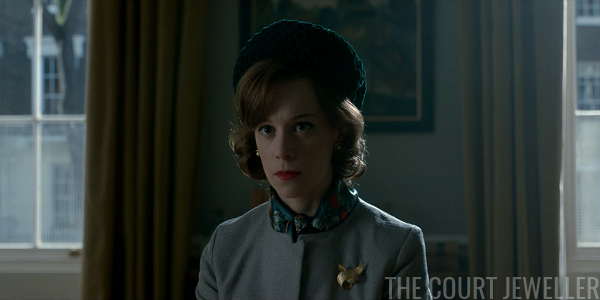
Things are less happy for Eileen Parker, who has worn a knotted golden brooch to visit a solicitor, with the intention of untying the knot with Mike. (In reality, the Parkers reportedly began living apart months before the Commonwealth tour even began.)
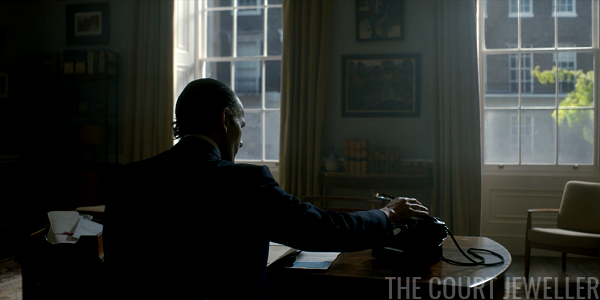
The lawyer tries to convince her that she should stay in the marriage, and he reminds her that she’ll need evidence of Mike’s bad behavior to procure a divorce anyway. Eileen bristles and says she’ll come back with evidence. Attorney-client privilege is apparently not a thing, because after she leaves, he immediately picks up the phone to blab about the meeting.
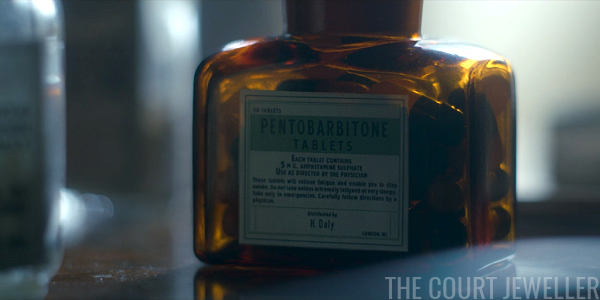
Meanwhile, Eden has reached the limits of available pharmaceuticals to help ease his pain. His doctor is shocked when Eden asks for something stronger than pentobarbitone — a drug so strong that, in high doses, it’s used in executions.
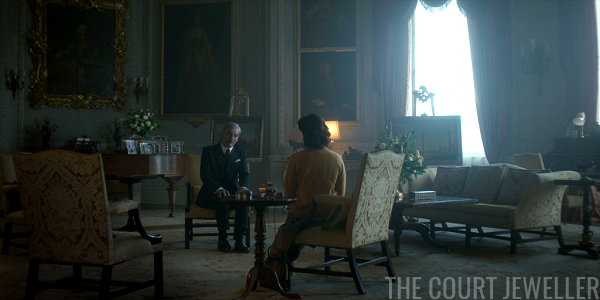
Running out of options health-wise — and stinging from the reaction to his military response to the Suez crisis — Eden goes to the palace to let the Queen know that he’s planning on taking a little leave of absence. (This really did happen in November 1956.)
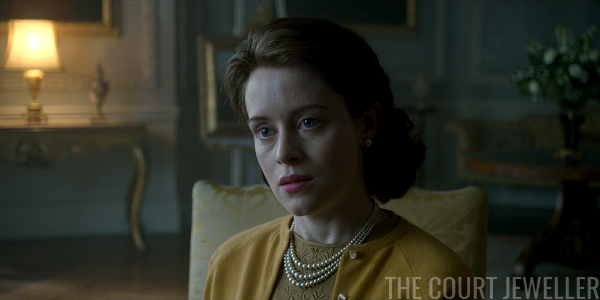
This is Elizabeth’s face when she realizes her prime minister isn’t heading to his country house for a little respite — he’s going all the way to Jamaica.
An interesting thing to note here, jewelry-and-costume-wise: the Queen’s private and public “uniforms” have pretty much merged at this point. We see her wearing the same clothes and jewels when she’s spending time with her family and with members of government. Her work self has pretty much merged with her private self at this point, it seems.
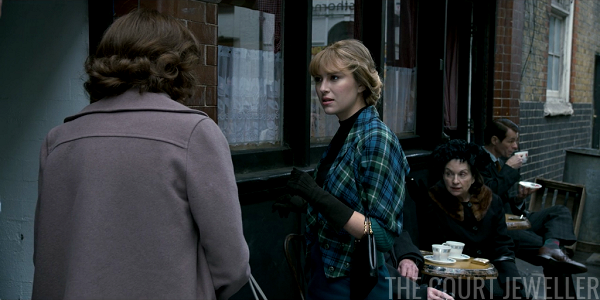
As Eden’s health crisis challenges the palace, Eileen Parker is in the midst of solving a crisis of her own. She heads down to Soho and tracks down one of the waitresses who works during the Thursday Club meetings, looking for anything that will help implicate Mike and get her the divorce she wants. The waitress balks when she’s confronted outside the restaurant.
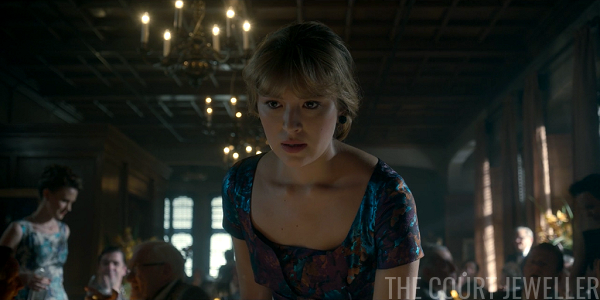
But later, after she’s harassed, pinched, and slapped in the rear during a club meeting, the look on her face reveals that she’s changed her mind about speaking to Eileen.
(Sidenote: where can I get this dress? It’s so fab!)
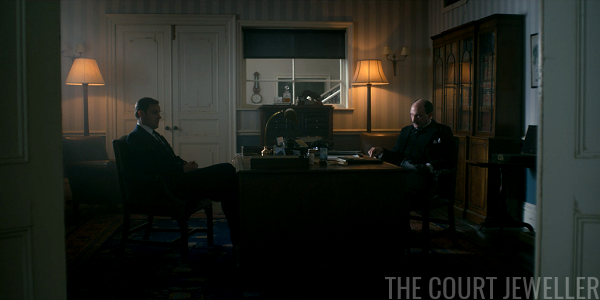
Via a chain that includes a sister-in-law and a tennis partner, the news of the impending Parker divorce reaches Bertie Pelham (er, Martin Charteris) and Michael Adeane in the palace press office.
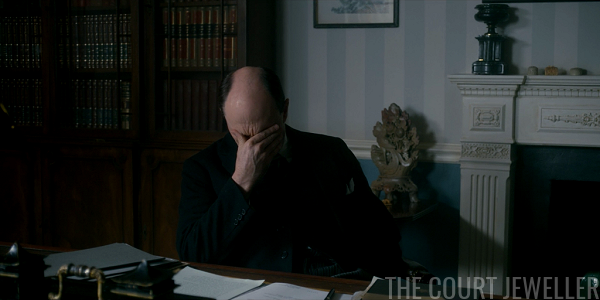
They agree that this could be a very, very bad thing, as Philip could certainly be implicated by association in Mike’s philandering. We aren’t privy to Adeane’s inner monologue, but I’d wager that it involves a fair bit of screaming.
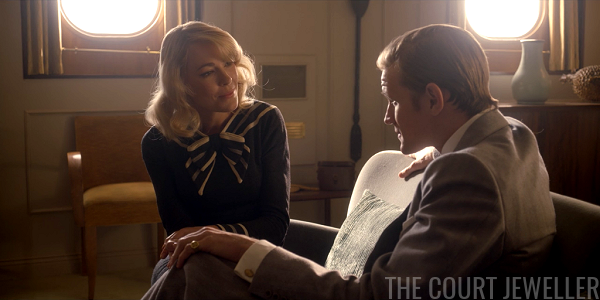
Back on Britannia, Philip’s ego has allowed him to invite Helen King aboard for an interview (and, presumably, a little hanky-panky.) Love that she decided to dress thematically for the location.
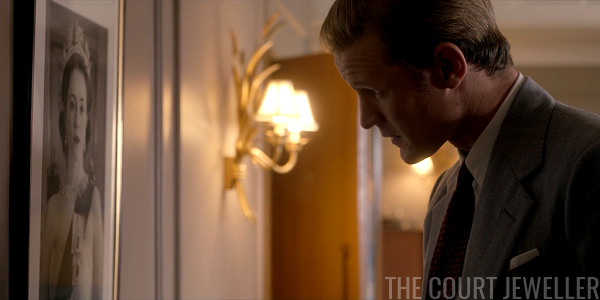
Even though his wife, Gloriana herself, looms over his bar cart, Philip pours a little liquid refreshment for both himself and his journalistic guest.
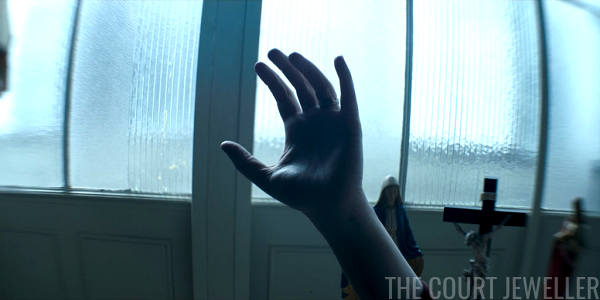
But then Helen begins to ask probing questions — first about British politics, and then about Philip’s family. We see a bit of memory flashback as she presses him on his mother’s illness and his father’s abandonment, as well as the tumultuous assassinations and exiles that colored his early life.
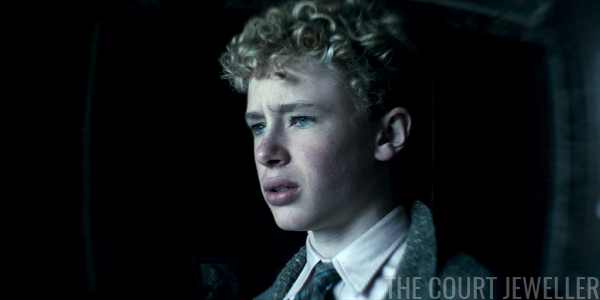
We see a Young Philip in flashback: isolated, watching his mother as she’s carted off to a mental hospital, standing alone on a train platform. Helen even brings up his education and his connection to his sisters, with their Nazi ties.
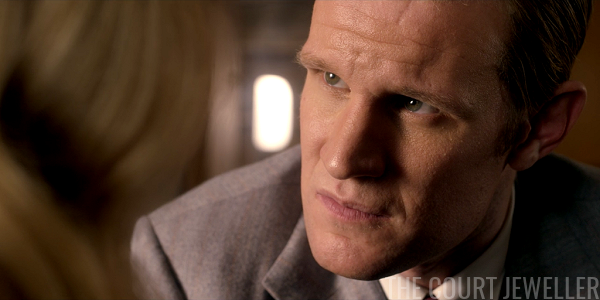
Philip very quickly realizes that this entire interview was a mistake, and he responds with cold detachment to every question. (I have a strong suspicion that the writers watched his contentious interview with Fiona Bruce while working on this scene.) He ends the interview abruptly and is clearly ticked off at himself for being led by his libido rather than his brain.
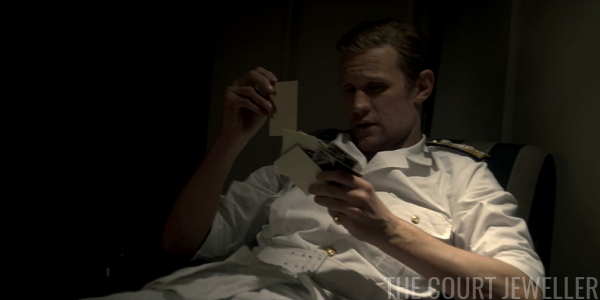
It’s a dark and stormy night aboard the ship, and as the weather rages outside, Phil has a bit of an emotional breakdown in his cabin, staring moodily at photos from his childhood.
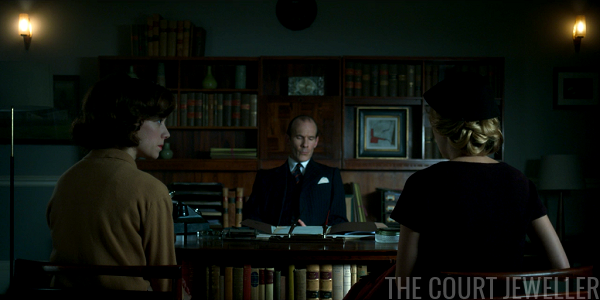
In London, the Thursday Club waitress reveals that she’s had an affair with Mike Parker, but she gets cold feet again when the solicitor reveals that she’ll have to testify in court.
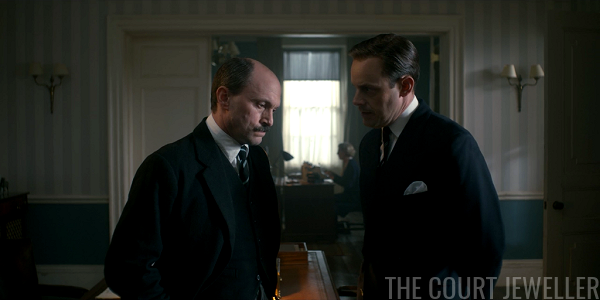
Because they’ve basically got a private line straight to Eileen’s lawyer, Charteris and Adeane put their heads together to try to come up with a solution to the continuing Parker divorce crisis.
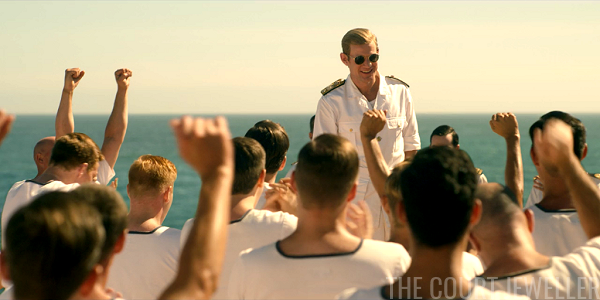
While Philip tries to lift his spirits by challenging everyone aboard the Britannia to a beard-growing contest.
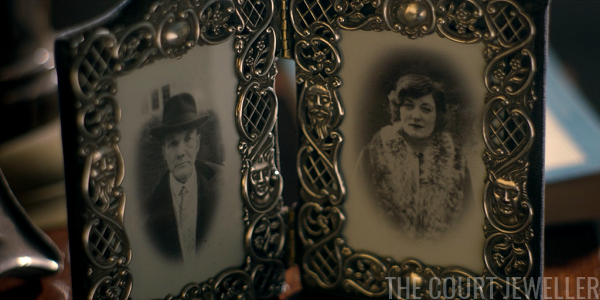
In private, though, he’s still looking at pictures of his parents and thinking about all of the childhood trauma that Helen King so helpfully dredged up.
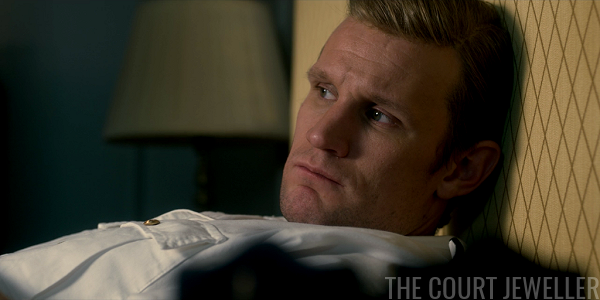
While he broods, Mike Parker comes in and lets him know that the palace has decided Philip will make a Christmas speech of his own, as a companion to the Queen’s.
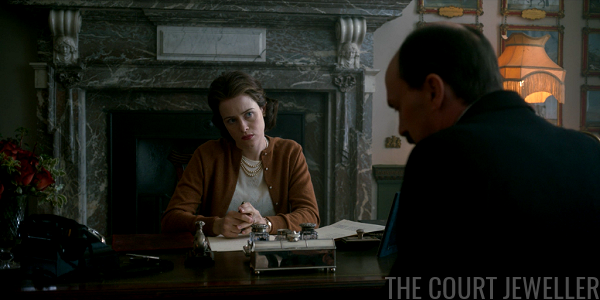
As Elizabeth twists her wedding and engagement rings, Adeane tells her about the Christmas message plan. The dueling speeches will help the public to hear the couple together, even if they can’t currently see them that way. (In reality, the press announced in early November that the couple would both make Christmas speeches; Philip’s was simply the last segment in a round-the-world program called “Voices Out of the Air.”)
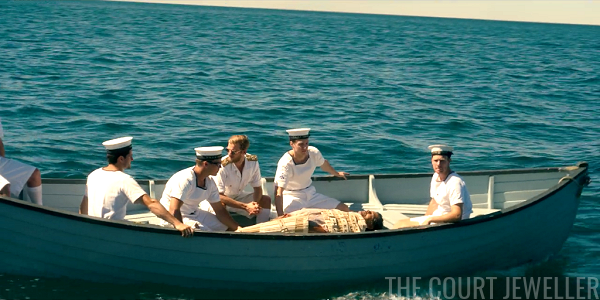
The Britannia receives a distress call while out at sea, because they’re the only ship in the area with a doctor aboard. They pick up a ship’s captain who has lost his vessel and crew, and they provide him medical attention aboard the royal yacht.
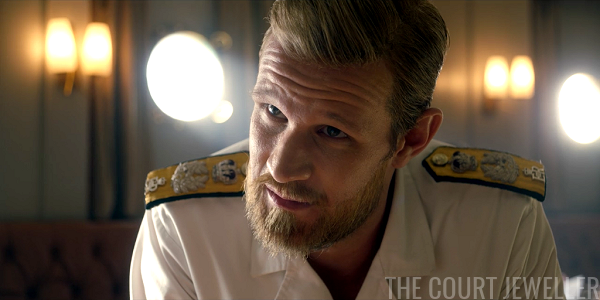
Philip, who has grown (an extremely fake) beard during the big contest, pulls rank and decides that the ship will go off course and off schedule to return the injured man to his home island.
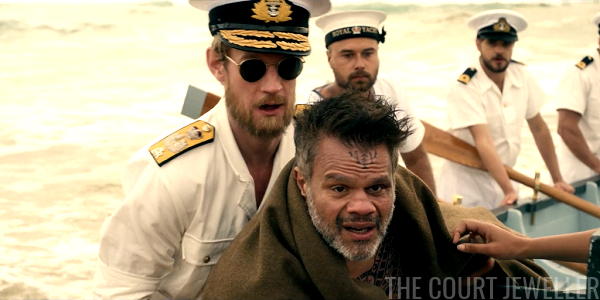
They receive a heroic welcome from the man’s family and community as he’s brought home.
So, did this really happen on the tour? Well — sort of. In January 1957, the Britannia really did travel 200 miles off course to retrieve an Argentine sailor who was suffering from appendicitis. They removed him from his ship, the Mabel Ryan, so that doctors aboard the Britannia could operate on him. The operation was successful, and he was returned to his ship. Given the precarious nature of British-Argentine relations (Philip’s tour included a trip to the Falklands), the move apparently garnered lots of Argentine good will for the Duke.
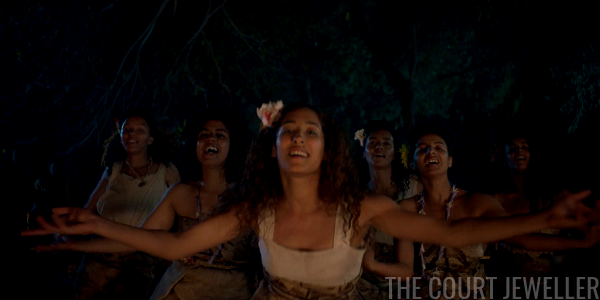
The more dramatic and tropical version of Philip’s tour rescue includes lots of dancing girls and shenanigans. Parker promptly writes a damning letter — implicating both himself and Philip in said shenanigans — and sends it to the Ghost of Baron at the Thursday Club.
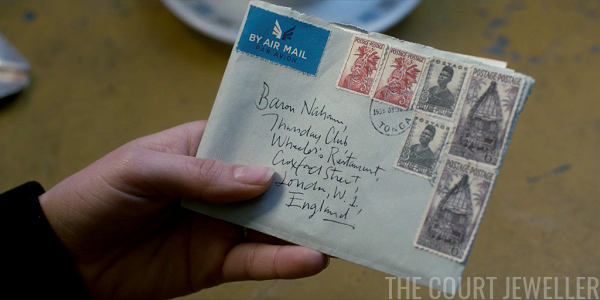
…where it’s filched by the waitress, who promptly hands it off to Eileen Parker. The waitress tells Eileen that the royal tour is like a five-month stag night, with “whores in every port.”
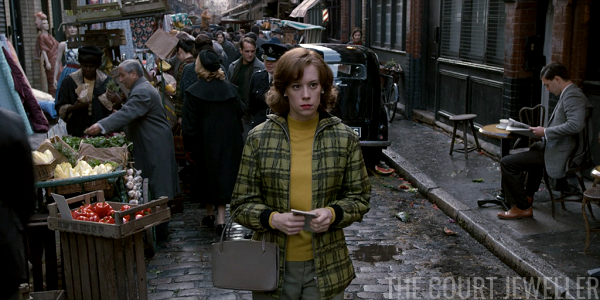
The letter provides Eileen with just the kind of evidence she’ll need to sue Mike for divorce.
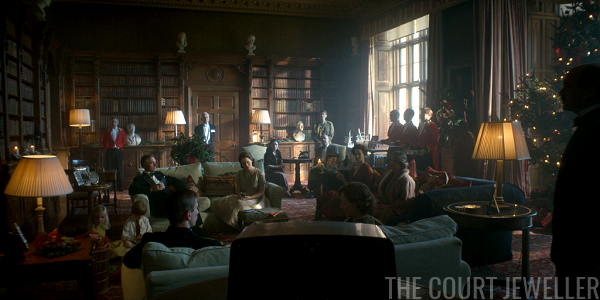
But first, it’s Christmas! At Sandringham, the Windsors are gathered around to listen to Philip’s Christmas speech on the wireless. I love the composition of this shot — it reminds me of the old Laurits Tuxen paintings commissioned by Queen Alexandra.
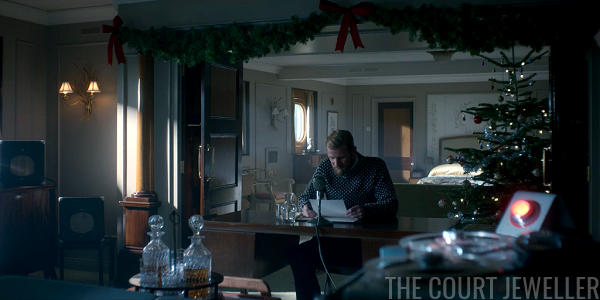
Aboard Britannia, Philip reads out his speech live on the air. (In reality, the speech was recorded while he was visiting New Zealand, because the BBC didn’t trust the radio link to Britannia.)
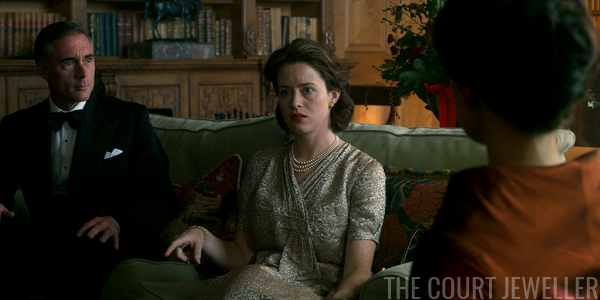
These, hilariously, are Dickie’s and Elizabeth’s faces as they work on a complicated geography question: where precisely Philip is located on the globe.
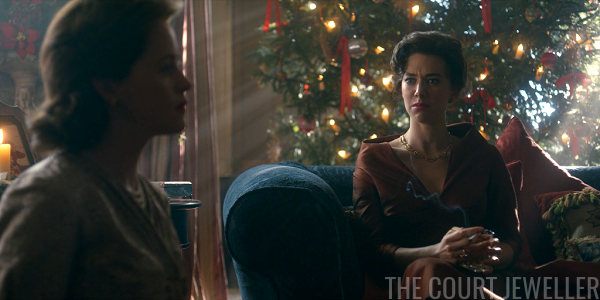
Philip’s broadcast focuses on the areas the tour has visited, and the family that they’re missing back home, and his loneliness. (Philip’s real speech from Britannia focused on the virtues of the Commonwealth as an institution.) Margaret, wearing gold jewelry, says she thinks Philip sounds odd, like “an impersonator.”
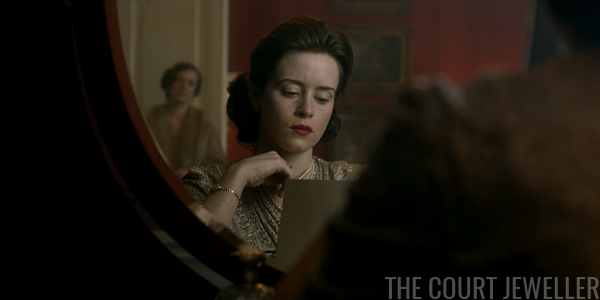
As the Queen prepares to make her own broadcast, she fiddles with her pearls — the uniform and role are making her a bit uncomfortable here ahead of her public performance.
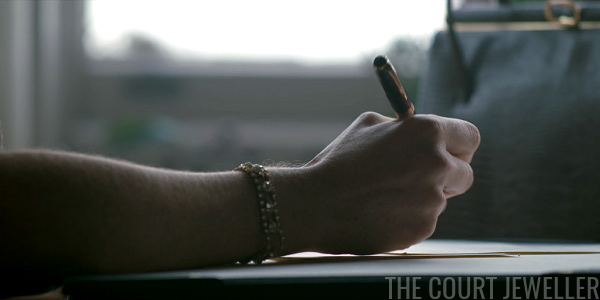
We also get a glimpse of an invented diamond bracelet as she revises the speech.
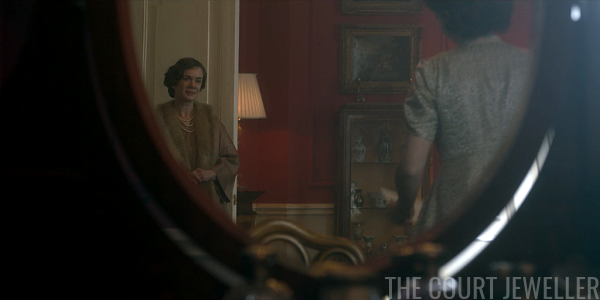
The criminally-underused Queen Mother, decked out in Christmas pearls, has been sent to fetch the Queen. (I guess that’s how you use a former queen consort — send her on errands?)
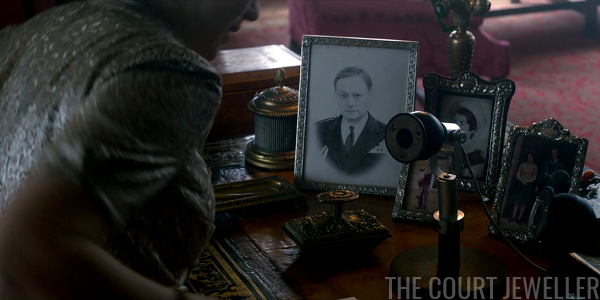
Elizabeth sits down at a desk featuring pictures of both of her parents as she prepares to broadcast her message.
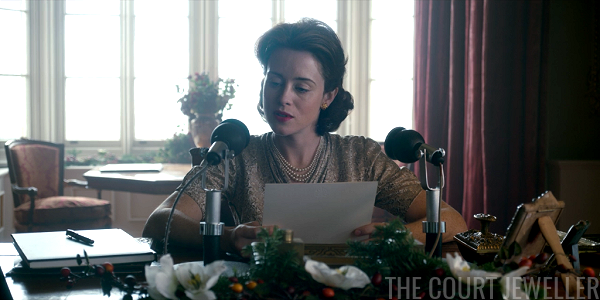
She speaks directly to Philip during part of her speech, noting how much the entire family misses him at Sandringham. (Her real 1956 speech focused on refugees, urging everyone to realize that there is “room at the inn” to accomodate those displaced by war and violence. It was also the last Christmas message broadcast only on radio; in 1957, the speech was also aired on television. The wardrobe department seems to have used that broadcast as a template for her costume and jewels here.)
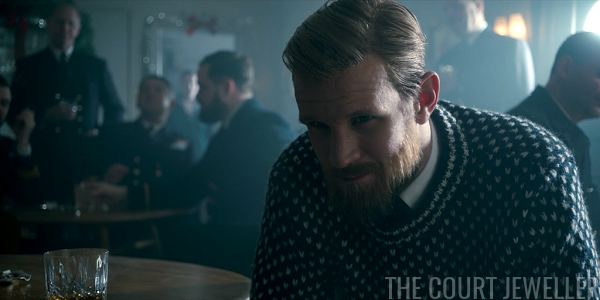
Philip listens to his wife’s voice aboard Britannia, and he seems to like what he hears.
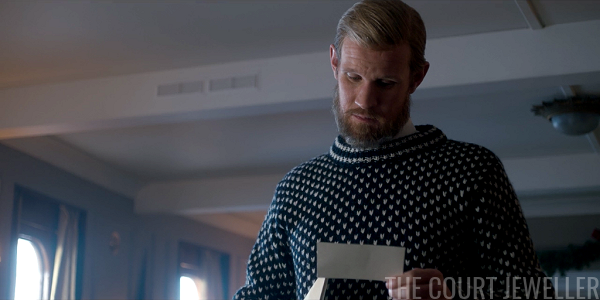
He finally admits that he’s a little homesick, and he returns to his cabin to revisit that message Elizabeth left in his briefcase in October: “Always remember you have a family.” What first seemed like a threat now feels like a reassurance.
Leave a Reply